
Peter Costello, chairman of the Nine Network, has estimated the proposals could be worth up to $600m a year across the industry. That would be handy cash dropping straight to the bottom line but it’s not a pot of gold to finance journalism nationally.
Google and Facebook believe the total will be less than that. The decision to introduce a bargaining mechanism that recognises the financial benefit the platforms give publishers in traffic referral will reduce platform payments. Nine’s outgoing CEO, Hugh Marks, conceded as much when he criticised that concession in his papers last Thursday.
Yet the government is taking on two of the planet’s biggest tech companies and may give publishers a foot in the door for the next, more important round of Australian Competition & Consumer Commission media probing. The ACCC is running two separate inquiries into the power of the platforms in the market for online advertising. Both are due to report this month.
A read through the April submission to the ACCC by News Corp, publisher of this newspaper, suggests it believes traditional media are being grifted by the platforms’ ability to sell advertising against content produced by news companies.
Given the total advertising market globally has expanded dramatically over the past decade but the share held by traditional media companies has been falling sharply, this may be where substantial financial upside lies. Facebook and Google have about 70 per cent of a global digital advertising pie worth more than $400bn this year, despite the COVID-19 advertising downturn. That is expected to top $800bn by 2027.
The publishers’ advertising arguments are more technical than those about news. Essentially Google dominates the online programmatic advertising marketplace and owns most of the tools used to build and serve the advertising. It can compete against ads served by traditional publishers because it controls the entire marketplace.
The smartest advertising thinker I know is Rupert Murdoch, who said way back in 2007 that Google search would become the greatest “gold seam” in advertising history. Seeing the writing on the wall for journalism, he declared in 2009 that news was valuable and expensive to produce. It should be paid for online just as it was in print. That was controversial back then but is accepted wisdom now, aggregators aside.
Yet Google and Facebook have a point when they say complaints by news publishers are no different from complaints in other industries disrupted by online innovation. No one would argue Uber needs to compensate owners of traditional taxi licences or Airbnb should subsidise traditional bricks-and-mortar real estate rental businesses.
Yet deals can be done: Airbnb does now share revenue from properties listed by traditional real estate operators but also listed on Airbnb. Similarly, last week’s News Media and Digital Platforms Mandatory Bargaining Code Bill outlines a sensible road forward for platforms and news providers to reach payment deals and a compulsory arbitration process if they can’t. It’s happening at a corporate level too. On Friday, News Corp global CEO Robert Thomson said the company was close to finalising global content licensing deals with Google and Facebook.
Publishers have legitimate gripes that go beyond payment. A good example is Google rankings of exclusive stories that are pushed down in search rankings by non-paywalled outlets reporting other people’s original work. A prime example is this newspaper’s regular Newspoll results, paid for and owned by The Australian, but often pushed down in search by free sites writing off the poll’s numbers.
Yet platforms make a good point when they say it was not Facebook and Google that really damaged the news business but online classified pure plays more than a decade ago. In this country think Seek, Carsales, realestate.com.au and Domain, which between them now control most of the classified advertising that used to support weekend newspapers.
Traditional publishers failed to defend their jobs and cars classified businesses. Lachlan Murdoch invested in REA, and the former Fairfax Media in Domain. Each is now more valuable than the newspapers that once hosted their ads.

Nor has this happened only in print. Streaming services such as Netflix and Stan are disrupting traditional free-to-air broadcasting and pay TV, itself a disrupter of television in the 1990s.
Where the old media model used content — either news or entertainment — to create a community attractive to advertisers, the platforms have global audience reach never previously imagined. They use digital technology to measure the effectiveness of an ad that once required faith on the part of paying advertisers. But big data analytics give Google and Facebook insights into consumer behaviour that while commercially valuable are in many people’s eyes socially undesirable. The push for regulation will only grow.
The Australian Financial Review, seldom a supporter of government intervention, on Thursday linked last week’s news reforms to the ACCC’s platform advertising inquiries. It said Facebook and Google today have “a dominance over the digital pipes and conduits of the information superhighway that is similar to the monopoly electricity wire or water pipe companies have over essential infrastructure”.
“Businesses not on Google and Facebook are not really present on the internet ‘grid’ or ‘mains’,” the AFR editorial said.
It’s true. When the US forced the break-up of telecommunications giant AT&T in 1984 because it had too much market power, who could have imagined a Facebook with two billion users or a Google with four billion users and 96 per cent of all internet searches globally?
Both use algorithms based on personal online preferences to send like-minded content back to us. They host vicious, defamatory content and escape the defamation laws that govern ordinary publishers. They are among the richest businesses in the world by market capitalisation but claim they can’t afford to hire the content moderators little country newspapers have to.
We don’t yet know how Facebook and Google will react to the latest media bill. Facebook originally said it would block news to Australian users rather than pay publishers. In my view both companies will accept the new rules. Google is already facing antitrust legal action in the US and on Wednesday the US Federal Trade Commission and most states launched action seeking the break-up of Facebook.
It’s worth remembering the antitrust case against Microsoft — settled in 2001 — created the environment for dramatic expansion in the tech sector.








Reaction to the federal government’s proposed news bargaining code designed to ensure traditional publishers are paid for content on Google and Facebook is probably too optimistic.